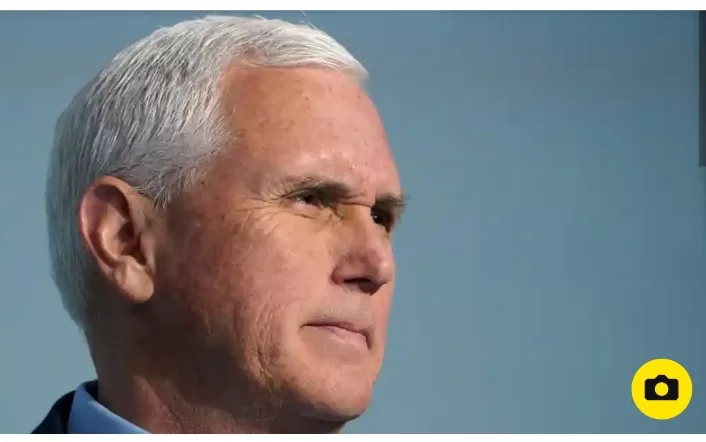In an unexpected turn of events, former Vice President Mike Pence, a contender for the Republican presidential nomination in the forthcoming 2024 election, has decided to suspend his campaign. Pence made this announcement during an event hosted by the Republican Jewish Coalition in Las Vegas on Saturday, conceding that his campaign was trailing, with former President Donald Trump leading the pack.
“I have come to a realization, after deep reflection and prayer, that this is not my moment. Therefore, it is with great deliberation that I am suspending my presidential campaign, effective immediately,” Pence revealed.
Pence, aged 64, who previously served as the governor of his home state of Indiana after representing it as a congressman, had been facing an uphill battle in his campaign. He had yet to qualify for the upcoming third GOP debate scheduled for November 8th, falling short in terms of required campaign contributions.
Pence’s announcement at the Nevada event, attended by other prominent contenders for the Republican nomination, including Trump and Ron DeSantis, the governor of Florida, took many by surprise.
While standing on the stage at the event, Pence, a staunch Christian conservative, invoked the words from Ecclesiastes, stating, “The Bible teaches us that there is a time for everything under the sun,” and continued, “And I have come to the conclusion that this is not my time.”
Pence, displaying his characteristic lack of visible emotion, made the announcement in a matter-of-fact manner, and then, in a more resolute tone, proclaimed, “However, I want to assure you all that I will never waver in my commitment to champion conservative values and to tirelessly advocate for principled Republican leaders across the nation, as I pledge before God.”
The audience responded with enthusiastic cheers, whistles, and extended applause, prompting Pence to humbly express his gratitude after several minutes.
Pence’s campaign for the presidency had struggled to gain momentum. Throughout his career, he had been a loyal supporter of Trump, even during the former president’s controversial single term, marked by two impeachments, one related to Ukraine and the other stemming from the Capitol insurrection on January 6, 2021.
However, the rift between Pence and Trump became unbridgeable when Pence, in his role as President of the Senate, refused to heed Trump’s calls to challenge Joe Biden’s victory in the 2020 election. As a result, Trump condemned Pence via social media, leading to crowds of extremists chanting “Hang Mike Pence” as they stormed the Capitol, attempting to halt the certification of Biden’s victory. Pence and other members of Congress were compelled to evacuate the congressional chamber for their safety.
On January 7, Congress ultimately certified Biden’s victory, but a significant number of Republicans refused to endorse the result.
Pence, who launched his campaign for the 2024 GOP nomination in June, took the opportunity to criticize Trump for his actions on January 6, describing them as “reckless.”
Pence highlighted his congressional and gubernatorial record, emphasizing his stance against abortion and his fiscal conservatism. He also addressed issues such as inflation, the national debt, and challenges at the US-Mexico border.
During his campaign, Pence underscored his time as vice president, noting, “I was honored to stand alongside President Donald Trump throughout our tenure.” He added, “It is important for the American people to know that on that fateful day [January 6, 2021], President Trump demanded that I choose between him and the Constitution. And anyone who asks someone to prioritize their interests over the Constitution should never hold the office of the President of the United States again.”
Pence is known for his strong anti-abortion stance, opposition to LGBTQ+ rights, fiscal conservatism, and a hawkish approach to foreign policy. He often states, “I am a Christian, a conservative, and a Republican, in that order.”
Pence’s decision to certify Biden’s election resulted in a loss of support from Trump’s core base of followers, who viewed it as an act of betrayal. Pence struggled to garner the support of anti-Trump Republican primary voters and donors. Opinion polls consistently placed his candidacy in the low single digits, and he faced difficulties raising funds since announcing his presidential bid in June.
By October, Pence’s campaign faced financial challenges, with limited cash reserves. Despite investing time and resources in Iowa, the first Republican nominating state, his campaign failed to gain significant traction there.
In mid-October, Pence disclosed that his campaign was $620,000 in debt for the third quarter, with just $1.2 million in available funds, falling far short of other Republican rivals with more robust financial backing.
Notably, several former vice presidents who aspired to become presidential nominees, such as Republican George H.W. Bush in 1988 and Democrat Al Gore in 2000, achieved their objectives. Pence, however, faced unique challenges, ultimately leading to his decision to suspend his campaign.
Reuters contributed to this report






